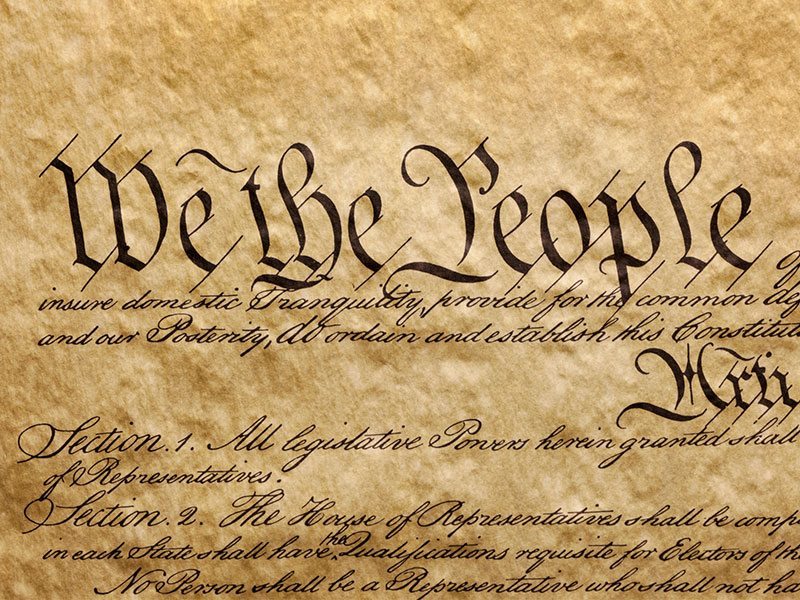“Corporations are people my friend.”
In 2011, then Republican presidential candidate, Mitt Romney, made national headlines when he ignominiously made that retort at the Iowa State Fair when an audience member suggested that corporate taxes be raised to help pay for Social Security, Medicare, and Medicaid. When Romney tried to brush off the suggestion by equating corporations with average taxpayers, the crowd pushed back, yelling that corporations weren’t in fact people. Romney then doubled-down in a dismissive tone, stating matter-of-factly, “of course they are.”

Former Republican presidential candidate, Mitt Romney.
Nearly seven years and two presidential elections since, it would be easy to dismiss Romney’s view as just the clumsy response of an out-of-touch wealthy politician, except for the fact that Romney was expressing an opinion commonly held by most conservative political and business leaders. In fact, throughout U.S. history, corporations have laid claim to the same rights as ordinary people. Instead of protecting everyone’s interest, however, those claims are too often made to circumvent consumer and environmental protections and avoid having to pay their fair share.
In a new report released today by Greenpeace and Free Speech For People, we review a disturbing and escalating pattern of corporate attempts to twist the U.S. Constitution and Bill of Rights to serve their own interests instead of the interests of “We the People,” whose self-ruling principles these bedrock accords were designed to protect.
The corporate strategy is simple: sabotage environmental laws and regulations that protect real people and communities in court. It’s typically a last-ditch effort when the usually heavy-handed approaches (e.g. lobbying) haven’t worked.
For instance, the American public has a right to know if commercial products threaten our health and wellbeing. But when Vermont passed a law mandating that manufacturers warn consumers when their lightbulbs contain toxic mercury, the National Association of Electrical Manufacturers challenged the rule in court, claiming that warning labels would be a form of “forced corporate speech” that violated their Constitutional rights. Fortunately, a judge rejected this ludicrous claim.
More recently, Exxon has fought an investigation by New York and other states into whether it misled investors and the public about the risks of climate change. In an effort to stifle this investigation, Exxon punched back in court, alleging, among other dubious claims, that its “Constitutional rights” were being violated. Its argument? That the investigation infringed on the oil company’s right to free speech by keeping it from participating in the public debate on climate change (the company conveniently failed to mention that for many years it “participated” in that debate by sending tens of millions of dollars to leading climate change deniers and front groups). Thankfully, judges dismissed both cases this month, referring to Exxon’s claims as “a wild stretch of logic” based on “extremely thin allegations.” More importantly, the judges in each case reaffirmed that fraud is not protected by the First Amendment or any other amendment in the U.S. Constitution.

Representatives speak during a Press Conference at the Capitol in Washington, D.C. Speakers condemned the move by House Science, Space and Technology committee chair Rep. Lamar Smith, R-Texas, to hold a hearing on his power to issue and enforce subpoenas against non-governmental group and the attorneys general of two states seeking emails about investigations of Exxon Mobil related to climate change denial.
While these decisions give reason for optimism, other corporations have won their own victories in court. For instance, a coal company succeeded in arguing that removing a tax break it benefitted from was a violation of the Fourteenth Amendment’s Equal Protection Clause. Milk and dairy manufacturers have successfully fought labeling requirements for the artificial growth hormones in their products. And across the country, corporations continue to wage federal, state, and local legal battles to advance arguments that have less to do with protecting Constitutional rights than achieving greater profit margins.
And so the simple truth is this: we cannot defend the Constitution merely by procuring our own rights; we must also fight the efforts of those who would usurp these rights to harm others.
That includes drawing attention to patterns of abuse to warn citizens how their environmental rights are under attack along with policies designed to protect families and communities. We can achieve this by:
- Reading the new report by Greenpeace and Free Speech For People, “Contaminating the Courts: How Corporations Are Misusing the Constitution to Attack the Environment”;
- Talking to your friends and neighbors about what you’ve read and what corporations are actively attempting and succeeding in doing;
- Writing to your local newspapers so that your community knows how much and what is at stake; and
- Asking your elected officials and candidates where they stand on corporate claims to personhood so that we can hold accountable those whose jobs it is to protect our wellbeing. The 2012 presidential election was a start.
But in order to see this through to the end, we must heed the words of Abraham Lincoln, who made it clear that: “We the people are the rightful masters of both Congress and the courts, not to overthrow the Constitution but to overthrow the men who pervert the Constitution.”



